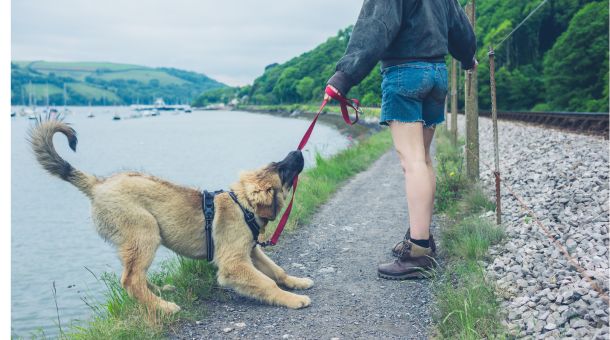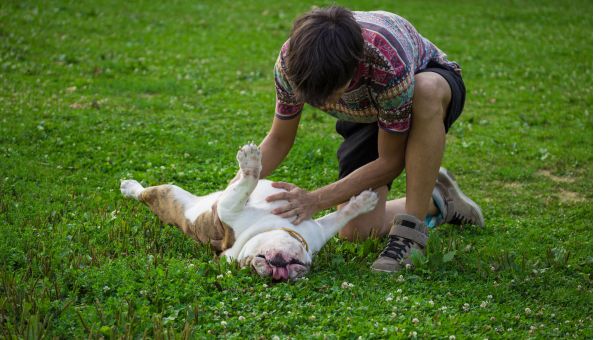Why does my dog kick his back legs randomly? Why does my dog kick his back legs randomly? Why does my dog kick his back legs randomly? Why does my dog kick his back legs randomly?
Dogs are fascinating creatures with some quirky behaviors that can leave us scratching our heads. One such behavior is when a dog kicks his back legs randomly, even when lying down or sitting still. While it may seem odd, this behavior has a purpose.
This article will explore why dogs kick their back legs randomly and what it means for their health and well-being. We will also discuss when you should be concerned about this behavior and what you can do to help your furry friend feel more comfortable.
What are Kicking Back Legs?

Kicking back legs, or “paddling,” is commonly seen in dogs moving their hind legs in a rhythmic motion, almost as if pedaling a bicycle. The motion may be gentle or vigorous and can occur while the dog is lying down, sitting, or standing up.
Some dogs may also kick their back legs while sleeping or when being petted in certain areas of their body. This behavior can be normal and harmless but also indicate an underlying health issue or discomfort. Observing your dog’s behavior and seeking veterinary attention if you notice any unusual or concerning symptoms is essential.
Why Does My Dog Kick His Back Legs?
Dogs kicking their back legs is a common behavior with different causes, ranging from natural, instinctual behavior to a sign of medical issues. Below are the common reasons why dogs kick their back legs:
Stretching and relieving tension:
Dogs naturally stretch their muscles as humans do. Kicking their back legs is one of the ways dogs stretch their muscles, especially after a nap or a long period of inactivity. The movement helps loosen their muscles, promotes blood flow, and relieves tension.
Scratching an itch:
Kicking back legs can also be a way for dogs to scratch an itch in hard-to-reach places. For example, dogs might kick their back legs to scratch their belly, behind their ears, or around their tail.
Expressing pleasure:
When a dog enjoys physical contact, such as a belly rub or a scratch, it may kick its back legs to express its pleasure. This is a common and harmless behavior.
Marking their territory:
Dogs are territorial animals and use different methods to mark their territory. Kicking their back legs after urinating or defecating is one way to mark their territory by spreading their scent.
Medical issues:
In some cases, kicking back legs can indicate underlying medical issues. For instance, dogs with allergies may kick their back legs to relieve itching and discomfort. Similarly, dogs with arthritis or nerve damage may kick their legs to alleviate pain or discomfort.
Involuntary muscle movement:
In rare cases, dogs may kick their back legs due to involuntary muscle movements. This can occur as a result of a neurological condition or seizure. If this behavior occurs frequently, it is essential to consult with a veterinarian to determine the underlying cause.
What to do if your Dog is Kicking Back Legs?
If your dog is kicking with their hind legs And you are concerned, here are some steps you can take:
- Take note of when your dog is kicking their back legs and how often they do it. Observe if there are any specific triggers or patterns associated with the behavior.
- Examine your dog’s legs and paws to see any cuts, bruises, or signs of discomfort. If you notice any visible injuries or discomfort, contact your veterinarian.
- If you suspect that your dog’s kicking behavior is due to a medical issue, it is important to consult with your veterinarian. They can perform a physical exam and run necessary tests to determine the underlying cause.
- Suppose your dog is kicking their back legs due to an underlying medical issue, such as arthritis or allergies. In that case, your veterinarian can recommend appropriate treatment, such as medication or changes to their diet.
- If your dog is kicking their back legs due to discomfort or pain, provide them with comfort and support. Ensure they have a comfortable bed or a soft place to rest, and avoid activities or situations that exacerbate their symptoms.
Common Causes of Random Back Leg Kicking in Dogs?

There are several common causes of random back leg kicking in dogs. One of the most common reasons is an involuntary reflex called the scratch reflex.
This reflex is triggered by a sudden irritation or sensation on the dog’s skin and causes them to kick its leg to scratch itself. Dogs may also kick their back legs as part of their play behavior, often involving running, jumping, and play-fighting.
Another common cause of back leg kicking in dogs is pain or discomfort. Dogs may kick their back legs to alleviate pain or discomfort caused by various medical conditions such as arthritis, hip dysplasia, or allergies. Back leg kicking can also be a sign of neurological problems in some cases, affecting a dog’s ability to control its movements.
Lastly, some dogs may kick their back legs randomly due to stress or anxiety. This is especially common in dogs that have experienced trauma, fear, or separation anxiety. They may kick their legs to release their anxiety or pent-up energy.
If your dog is randomly kicking their back legs and you are concerned, it is important to consult your veterinarian to rule out any underlying medical conditions or issues.
By understanding the common causes of back leg kicking in dogs, you can take appropriate steps to help ensure your furry friend’s health and well-being.
Medical Conditions That Can Cause Your Dog to Kick Their Back Legs?
Several medical conditions can cause a dog to kick their back legs. The following are some of the most widespread conditions:
Arthritis:
Arthritis is a common condition that affects dogs as they age. It can cause pain and stiffness in the joints, making it difficult for dogs to move around. This discomfort can cause dogs to kick their back legs to relieve pain.
Hip Dysplasia:
Hip dysplasia is a genetic condition that affects the hip joint. It causes the joint to develop abnormally, resulting in pain, stiffness, and difficulty in movement. Dogs with hip dysplasia may kick their back legs to alleviate pain.
Allergies:
Allergies can cause intense itching and irritation, leading to back leg kicking in dogs. Common allergens include flea bites, pollen, dust, and food. It is important to identify the cause of the allergy and treat it to prevent back-leg kicking.
Neurological Disorders:
Neurological disorders such as spinal cord injuries, seizures, and nerve damage can cause dogs to lose control over their limbs, resulting in back leg kicking.
Skin Infections:
Skin infections such as dermatitis, mange, and ringworm can cause intense itching and irritation, leading to back leg kicking in dogs.
Tick-borne Diseases:
Tick-borne diseases such as Lyme disease, Rocky Mountain spotted fever, and Ehrlichiosis can cause pain and discomfort, leading to back leg kicking.
Preventing Back Leg Kicking in Dogs: Tips and Strategies
Preventing back leg kicking in dogs involves caring for your dog’s overall health and well-being. Here are some tips and strategies to help prevent back leg kicking in dogs:
- Regular exercise helps keep your dog’s muscles and joints healthy, reducing the risk of conditions that can cause back-leg kicking. Ensure your dog gets regular exercise, such as daily walks or runs, to keep them active and healthy.
- Feeding your dog a balanced and nutritious diet can help prevent various medical conditions that may cause back leg kicking. Consult your veterinarian to determine your dog’s best diet based on age, breed, and health condition.
- Regular grooming and bathing help prevent skin irritation and itching, which can trigger back leg kicking in dogs. Ensure your dog is clean, well-groomed, and free from skin irritants.
- Fleas and ticks can cause intense itching and discomfort, leading to back leg kicking in dogs. Use flea and tick prevention products to protect your dog from these pests.
- Stressed or anxious dogs may kick their back legs to release their anxiety. Provide a calm and safe environment for your dog and engage in activities that help reduce their stress, such as daily exercise and playtime.
- Regular check-ups can help detect any underlying health issues before they become severe. This is particularly important for older dogs more prone to various medical conditions.
When to Seek Veterinary Attention for Your Dog’s Back Leg Kicking?
It is important to seek veterinary attention if your dog exhibits excessive or persistent back leg kicking. Here are some signs that may indicate the need for veterinary attention:
Frequent and Intense Kicking: If your dog is frequently and intensely kicking their back legs, it may be a sign of an underlying medical condition that requires treatment.
Limping: If your dog is limping or favoring one leg while kicking their back legs, it may indicate a joint or muscle issue that requires medical attention.
Skin Irritation: If your dog’s back leg kicking is accompanied by skin irritation, such as redness, swelling, or open wounds, it may indicate an underlying skin condition that requires treatment.
Behavioral Changes: If your dog exhibits other behavioral changes, such as decreased appetite, lethargy, or restlessness, it may indicate an underlying medical condition.
Age: As dogs age, they become more prone to certain medical conditions that can cause back leg kicking. If your dog is older and exhibiting back leg kicking, it is important to seek veterinary attention to rule out any underlying health issues.
conclusion
Dogs are highly intricate beings with a communication style that is vastly distinct from ours, making it challenging at times to comprehend their behavior. A dog kicking its hind legs could stem from various factors, with some being more detrimental than others.




